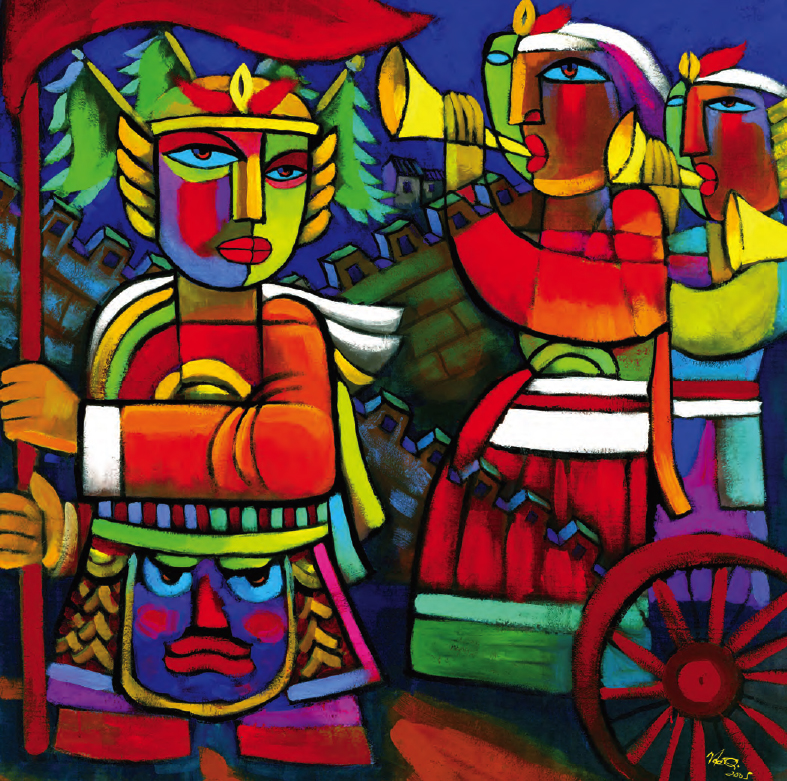God’s Promise: I Am With You
Lesson Five

Lesson Five: God with Us When We Are Powerless
Primary Scripture: 2 Chronicles 20:1–30; Deuteronomy 20:1–4
In the beginning of December a friend of mine said, “I keep thinking how heavy the holidays are this year for some people.” She went on to tell me that a friend who shares her pew at church had wept after worship the previous Sunday as he told her about his brother who wasn’t expected to survive the week. And then there was a friend whose marriage had fallen apart and another in the midst of a heart-wrenching struggle with infertility. A woman we both knew was weathering the waves of grief that come with a first Christmas alone after 60 years of marriage. And there was a grandmother whose oldest granddaughter overdosed last week. Some seasons it seems like the list of people in pain only gets longer.
“I just don’t know what to do, so I keep praying for them,” my friend said.
It occurred to me as she said it that, in fact, we don’t pray because we don’t know what to do. We pray because praying is exactly what to do.
It’s what King Jehoshaphat models for us in 2 Chronicles 20. In fact, his words to God nearly echo my friend’s words to me: “We do not know what to do, but our eyes are on you” (2 Chr. 20:12). God’s response to Jehoshaphat and all his gathered kingdom is, essentially, “What you’re doing is exactly what to do.” In 2 Chronicles 20:17, God says, “Take your position, stand still, and see the victory of the Lord on your behalf.” In the face of this threat, God says, do what you’re doing, keep your eyes on me. Draw close to me, in the proximity of prayer. When you feel powerless, look to, call upon, trust my power.
A couple of years ago, I began to notice how often I, and others, said, in response to someone’s difficulties or distress, “I’ll be praying for you. Let me know if I can do anything.” While it certainly wasn’t the impression I intended to give, that phrasing suggested that I thought prayer wasn’t actually doing something. And yet, the “Rules of Warfare” in Deuteronomy 20 urge us to turn to God as our first line of defense. Tapping into God’s power is the primary thing we should do. It’s been a subtle and sometimes inconsistent shift, but now I say, “I’ll be praying for you. Is there anything else I can do, too?”
When Jehoshaphat was overwhelmed by the threat of the approaching enemy, what he did, the action he took, was to pray. And the beauty and boldness of his prayer (re-read it in 2 Chronicles 20:6-12) should inspire us to do the same. Pray. Not as an afterthought or a last resort, but as our primary response to an overwhelming situation.
What threat or fear or pain are you or someone you know facing today? What causes you to feel powerless?
Have you prayed about it?
My kids are allotted an hour of screen time most days (unless we’re doing something more fun), and those minutes of game playing on their tablets is pretty precious to them. However, sometimes they forget to plug in their electronic devices so the tablets can be recharged for the next day, and, much to their distress, they discover a dead tablet right when they want to use it. They are, literally, powerless. Their response to this too familiar dilemma is to crouch on the floor next to the wall outlet with their ridiculously short charging cords tethering them to the power source as they play.
The effect is twofold. They are close to the source of power, and they are also close to one another, shoulder-to-shoulder by the outlet.
It seems to me that the thing we’re to do when we’re powerless—praying—has the same effect. We draw close to the source of power. And in the process, as we pray for and with one another, we draw close to one another. Note that it’s a corporate statement that Jehoshaphat makes, a “we” not an “I.”
We don’t know what to do, God, but our eyes are on you.
Amy Poling Sutherlun
Author of the 2018–2019 PW/Horizons Bible Study
******
Purchase a God’s Promise: I Am With You bible study and study along with us.
Call 800/533-4371 or order online
